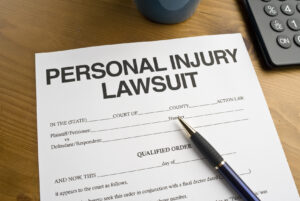
Just about every personal injury lawsuit begins the same way: a person sustains an injury because of another party’s negligence or intentional torts. Most personal injury claims are settled without going to court, but not all.
Our Tampa personal injury lawyers work with you to obtain a fair personal injury settlement through negotiation and mediation. However, we can file a personal injury lawsuit to take the case to court if the other party refuses to agree to a fair settlement.
Steps Involved in Filing a Personal Injury Lawsuit in Tampa, FL

While each case is unique, severe steps are standard in a personal injury lawsuit. If you file a personal injury lawsuit, you can expect the case to include the following phases:
Investigation and Filing of Claims
Before a lawsuit is filed, the attorney must investigate the claim to gather evidence proving liability and damages. The injured party has the burden of proof in a personal injury lawsuit. Therefore, you must have sufficient evidence to prove:
- The other person had a legal duty of care
- The party’s omissions or actions breached the duty of care
- The breach of duty was the proximate and direct cause of your injury
- You sustained economic and non-economic damages
Your lawyer files claims with the other party’s insurance provider and attempts to negotiate a settlement. If settlement is impossible, the case moves to the next step.
Filing a Complaint and Responsible Pleadings
Each personal injury lawsuit begins with filing a complaint in civil court. In Tampa, the complaint is filed with the Hillsborough Clerk of Court. When you file the complaint, you must pay the appropriate filing fees.
A complaint is the pleading that begins a court case. The person filing the complaint is the plaintiff. The parties being sued are the defendants.
The complaint sets forth the facts of the case, the basis for jurisdiction, legal arguments, and a demand for damages. The complaint must be served on the defendants with a court summons. The defendants have 20 days to file an answer or other responsible pleading.
It is important to note that the Florida statute of limitations sets deadlines for filing personal injury lawsuits. The deadlines vary based on several factors. It is in your best interest to talk with our lawyers as soon as possible after an injury to avoid missing a deadline.
Discovery Phase
After the pleadings are filed, the case moves into the discovery phase. The parties collect evidence from each other through one or more discovery tools. Common forms of discovery in a personal injury case include:
- Interrogatories – Written questions that must be answered under oath.
- Depositions – Out-of-court testimony under oath that can be used as evidence in court to impeach a witness.
- Requests for Production of Documents – Requests to review documents or physical evidence the other party intends to present as evidence or that is relevant to the case.
- Subpoenas – Court documents requiring a party to submit documents or appear for testimony.
- Requests for Admission – Written statements the other party must admit or deny under oath. The party may also respond that they do not have sufficient information to admit or deny the statement.
Discovery allows the parties to analyze the evidence the other side has to determine the strengths and weaknesses of their case and the opposing party’s case. In many cases, discovery sets the groundwork for pre-trial mediation and settlement negotiations.
Pre-Trial Motions and Conferences
If the parties do not agree to settle the case during pre-trial settlement conferences or negotiations, the parties may file one or more pre-trial motions. Pre-trial motions ask the court to rule on a specific matter. The matters generally relate to issues of law.
Examples of pre-trial motions include, but are not limited to:
- Motion for Summary Judgement
- Motion to Dismiss
- Motion to Suppress Evidence
- Motion to Allow Expert Testimony
The parties present their arguments for or against the motion in court. A judge decides the motion based on the law and evidence presented to support the parties’ positions.
Trial and Judgment
Personal injury trials move through several phases. A typical trial includes:
- Jury selection
- Opening statements by the lawyers
- Examination and cross-examination of witnesses (the plaintiff begins, followed by the defendant)
- Closing arguments by the attorneys
- Instructions to the jury by the judge
- Jury deliberation
- Return of verdict
In a personal injury case, the plaintiff must prove their claim by a preponderance of the evidence. That means the jurors must believe there is a greater than 50% chance that the defendant caused the plaintiff’s injuries. If so, the jurors rule in favor of the plaintiff and award the plaintiff a monetary judgment for damages.
Appeal
The case might not end with the jury verdict. Either party has 30 days to file an appeal if they believe they have grounds to overturn the jury verdict.
Should I Settle a Tampa Personal Injury Claim or File a Lawsuit?
Personal injury cases can take months or years to resolve. It depends on the facts of the case. However, filing a lawsuit and going to trial can add a year or more to the timeline for a personal injury case. Additionally, going to court does not guarantee a victory.
The pros and cons of a settlement versus a lawsuit must be weighed carefully. An experienced Tampa personal injury attorney analyzes the factors of your case to determine your legal options and which options are in your best interest. Your attorney provides you with their advice and explains why they recommend a specific course of action.
The decision of whether to accept a personal injury settlement is ultimately yours to make. That said, it helps to have the advice and guidance of a personal injury lawyer in Tampa with extensive experience handling cases similar to yours.
Before you accept a settlement offer in a personal injury case, it is wise to seek legal advice. Accepting an offer and signing a settlement agreement ends your case. You waive the right to file a lawsuit or demand additional compensation for claims.
Therefore, ensure the settlement offer is fair by talking with a lawyer. Insurance companies undervalue cases. Your claim could be worth more money than the insurance company offers for settlement.
Schedule a Free Consultation With Our Tampa Personal Injury Lawyers
Our attorneys at Winters & Yonker are seasoned trial lawyers with a proven track record of winning cases. Winters & Yonker Personal Injury Lawyers will help get you the money you deserve after an accident or personal injury. Contact us online or call us at (813) 223-6200 today for a free consultation.
